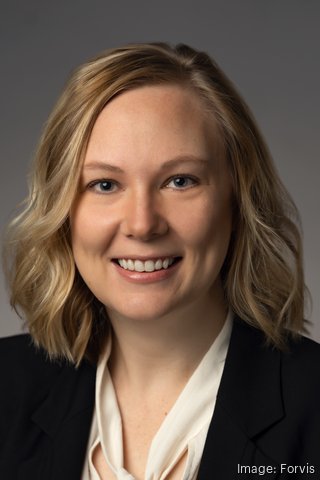Listen to this article 3 min
Kansas City is a hotbed for employee-owned companies, especially in architecture, engineering and construction. For proof, a quick glance at the 2023 Top 150 Private Companies List shows that ESOPs (employee stock-ownership plan) and cooperative-owned companies are king.
But what makes the metro so popular for employee-owned companies, and is this unique to Kansas City?
“We kind of have a joke in one of the ESOP organizations that Kansas City is the mecca of ESOPs because there are just so many of them,” said Angela Fisher, director of Forvis’ ESOP transaction services group.
The concentration of employee-owned firms, she said, derives from the fact that so many mature ESOPs are just good companies. Other owners look at those ESOP-owned firms and say, “How do we build that?”
Scroll to the bottom of the story to see the full Top 150 Private Companies List.
Though not the first, Burns & McDonnell is the most well known and the model everybody wants to emulate, said Greg Trees, CEO of employee-owned Dialectic Engineering and president-elect of the Heart of America chapter of The ESOP Association.
“Burns & Mac is the one that really started the momentum out of this,” Trees said. “The reason why they’re becoming so popular and powerful now is Burns & Mac and (former CEO) Greg Graves really tapped into the motivational piece of how ESOPs can make your engineering firm more and better.”
An ESOP, Trees said, not only pushes up engagement, but ultimately helps build wealth. Graves invested heavily in HR and used the ESOP to motivate employees to grow, which in turn made the firm one of the biggest not only in Kansas City, but in the world.
“Everybody wants to be Burns & Mac,” Trees said. “But it’s not just them — it’s Black & Veatch; now we’ve got Henderson, HNTB, Terracon. There are a lot of people who have been exposed in the city because of those big companies, so people are familiar with them, and when they hear ESOP, their ears perk up because they think very positive thoughts.”

War for talent
Fisher said a construction client once shared that it couldn’t compete in Kansas City without being an ESOP.
“‘There are too many big ones, good ones, for us to be competitive in the workforce, and how are you supposed to grow if you can’t get people?’ they said,” Fisher said.
One of that company’s reasons for becoming an ESOP was to attend job fairs and have just as many potential candidates lined up behind its table as at competing firms.
“It’s a war for talent here,” Fisher said.
It’s not like this all over the world, though, she said. The U.S. has other pockets of high-performing ESOPs, but Kansas City definitely represents one of the biggest concentrations.
A lot of that ESOP popularity comes from word of mouth. Business owners ask questions about what worked, what didn’t and how they can best take care of employees.
“They’re not secretive,” Fisher said. “They’re a different breed, these employee-owners. It’s truly this whole concept of how can we grow the company and better the team? How are we a team that you know is in it for the long haul? Because it’s much more of all the employees see the benefit of the financial reward. It’s truly a team mentality.”
Sharing success
Workers nationwide are tired of making other people rich and living paycheck to paycheck, Trees said.
“ESOPs are the opposite of that,” he said. “Everybody is sharing in success. There is more pressure on the executive team to keep salaries in check at the highest level and keep employees happy and funded than would be in any other situation — because I could get fired. I mean, I’m the CEO, but if they all got upset, I’m out, just like a public company.”
Preserving the legacy and culture that business owners have built becomes a priority for some as they start considering retirement, Fisher said.
It’s all about liking the people who work for you and wanting to reward them, she said. Baby boomers nearing retirement are looking for an exit strategy that will help preserve the culture of the companies they have built, and an ESOP makes that transition a bit easier.
“You can kind of think of it as not just like a Midwestern thing, but I think of it more as a rural America thing,” Fisher said. “Even though Kansas City isn’t rural, it’s that same kind of mentality. If someone else comes in and takes over the company, what’s going to happen to these people? It’s that sort of mindset that these owners have. And that’s why it works here.”
Revenue, 2022
| Rank | Prior Rank | Company / Prior rank (*unranked previously) |
|---|---|---|
1 | 1 | Dairy Farmers of America Inc. |
2 | 2 | Associated Wholesale Grocers Inc. |
3 | 3 | National Beef Packing Co. LLC |
